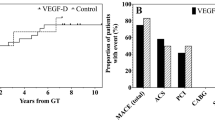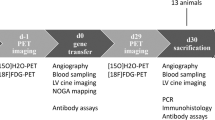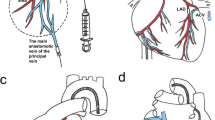Abstract
Adenovirus-mediated gene therapy holds promise for the treatment of cardiovascular diseases such as refractory angina. However, potential concerns around immunogenicity and vector dissemination from the target injected tissue require evaluation. This study was undertaken to evaluate the safety and biodistribution of XC001, a replication-deficient adenovirus serotype 5 vector expressing multiple isoforms of human vascular endothelial growth factor (VEGF), following direct administration into normal rat myocardium. Animals received the buffer formulation or increasing doses of XC001 (1 × 107, 2.5 × 108 or 2.5 × 109 viral particles). Based on in-life parameters (general health, body weights, clinical pathology, serum cardiac troponin I, plasma VEGF, and gross necropsy), there were no findings of clinical concern. On Day 8, intramyocardial administration of XC001 was associated with dose-related, left ventricular myocardial inflammation at injection sites, resolving by Day 30. XC001 DNA was not detected in blood at any time but was present at Day 8 around the site of injection and to a much lesser extent in the spleen, liver, and lungs, persisting at low levels in the heart and spleen until at least Day 91. These findings demonstrate that intramyocardial injection of XC001 is supported for use in human studies.
This is a preview of subscription content, access via your institution
Access options
Subscribe to this journal
Receive 6 print issues and online access
$259.00 per year
only $43.17 per issue
Buy this article
- Purchase on SpringerLink
- Instant access to the full article PDF.
USD 39.95
Prices may be subject to local taxes which are calculated during checkout






Similar content being viewed by others
Data availability
All data generated or analyzed during this study are included in this article and its supplementary information files.
References
Henry TD, Satran D, Hodges JS, Johnson RK, Poulose AK, Campbell AR, et al. Long-term survival in patients with refractory angina. Eur Heart J. 2013;34:2683–8.
Cheng K, de Silva R. New advances in the management of refractory angina pectoris. Eur Cardiol. 2018;13:70–9.
Krock BL, Skuli N, Celeste Simon M. Hypoxia-Induced Angiogenesis: Good and Evil. Genes Cancer. 2011;2:1117–33.
Wold WSM, Ison MG. Adenoviruses. In: Fields BN, Knipe DM and Howley PM (eds). Fields Virology, Vol 1. 6th ed. Lippincott Williams & Wilkins, Philadelphia, 2013. pp 1732–67.
Ylä-Herttuala S, Baker AH. Cardiovascular gene therapy: past, present, and future. Mol Ther. 2017;25:1095–106.
Povsic TJ, Henry TD, Ohman EM, Pepine CJ, Crystal RG, Reinhardt RR, et al. Epicardial Delivery of XC001 Gene Therapy for Refractory Angina Coronary Treatment (The EXACT Trial): Rationale, Design, and Clinical Considerations. Am Heart J. 2021;241:38–49.
Guzman RJ, Lemarchand P, Crystal RG, Epstein SE, Finkel T. Efficient gene transfer into myocardium by direct injection of adenovirus vectors. Circ Res. 1993;73:1202–7.
Mack CA, Patel SR, Schwarz EA, Zanzonico P, Hahn RT, Ilercil A, et al. Biologic bypass with the use of adenovirus-mediated gene transfer of the complementary deoxyribonucleic acid for vascular endothelial growth factor 121 improves myocardial perfusion and function in the ischemic porcine heart. J Thorac Cardiovasc Surg. 1998;115:168–76.
French BA, Mazur W, Geske RS, Bolli R. Direct in vivo gene transfer into porcine myocardium using replication-deficient adenoviral vectors. Circulation. 1994;90:2414–24.
Yuan B, Zhao Z, Zhang YR, Wu CT, Jin WG, Zhao S, et al. Short-term safety and curative effect of recombinant adenovirus carrying hepatocyte growth factor gene on ischemic cardiac disease. In Vivo. 2008;22:629–32.
Vassalli G, Bueler H, Dudler J, von Segesser LK, Kappenberger L. Adeno-associated virus (AAV) vectors achieve prolonged transgene expression in mouse myocardium and arteries in vivo: a comparative study with adenovirus vectors. Int J Cardiol. 2003;90:229–38.
Jones JM, Koch WJ. Gene therapy approaches to cardiovascular disease. Methods Mol Med. 2005;112:15–35.
Nayak L, Rosengart TK. Gene therapy for heart failure. Semin Thorac Cardiovasc Surg. 2005;17:343–7.
Zhang D, Gai L, Fan R, Dong W, Wen Y. Efficacy and safety of therapeutic angiogenesis from direct myocardial administration of an adenoviral vector expressing vascular endothelial growth factor 165. Chinese Med J. 2002;115:643–8.
Whitlock PR, Hackett NR, Leopold PL, Rosengart TK, Crystal RG. Adenovirus-mediated transfer of a mini gene expressing multiple isoforms of VEGF is more effective at inducing angiogenesis than comparable vectors expressing individual VEGF cDNAs. Mol Ther. 2004;9:67–75.
Stewart DJ, Hilton JD, Arnold JM, Gregoire J, Rivard A, Archer SL, et al. Angiogenic gene therapy in patients with nonrevascularizable ischemic heart disease: a phase 2 randomized, controlled trial of AdVEGF(121) (AdVEGF121) versus maximum medical treatment. Gene Ther. 2006;13:1503–11.
Amano H, Hackett NR, Kaner RJ, Whitlock P, Rosengart TK, Crystal RG. Alteration of splicing signals in a genomic/cDNA hybrid VEGF gene to modify the ratio of expressed VEGF isoforms enhances safety of angiogenic gene therapy. Mol Ther. 2005;2:716–24.
Kaminsky SM, Quach L, Chen S, Pierre-Destine L, Van de Graaf B, Monette S, et al. Safety of direct cardiac administration of AdVEGF-All6A+, a replication-deficient adenovirus vector cDNA/genomic hybrid expressing all three major isoforms of human vascular endothelial growth factor to the ischemic myocardium of rats. Human Gene Ther Clin Dev. 2013;24:38–46.
Schafer KA, Eighmy J, Fikes JD, Halpern WG, Hukkanen RR, Long GG, et al. Use of Severity Grades to Characterize Histopathologic Changes. Toxicol Pathol. 2018;46:256–65.
Thierry AR, Lunardi-Iskandar Y, Bryant JL, Rabinovinch P, Gallo RC, Mahan LC. Systemic gene therapy: biodistribution and long-term expression of a transgene in mice. Proc Natl Acad Sci USA. 1995;92:9742–6.
Schrader C, Schielke A, Ellerbroek L, Johne R. PCR inhibitors- occurrence, properties, and removal. J Appl Microbiol. 2012;113:1014–26.
Povsic TJ, Traverse JH, Henry TD, Rosengart TK, Crystal RG, Dittrich HC et al. Preliminary Safety, Tolerability and Efficacy of Direct Epicardial Administration of Encoberminogene Rezmadenovec to Ischemic Myocardium in Patients with Refractory Angina: Six Month Phase 1 Data. Abstract presented at: 2022 American Society of Gene and Cell Therapy Annual Meeting; Washington, DC. 2022;May.
Machitani M, Yamaguchi T, Shimizu K, Shimizu K, Sakurai F, Katayama K, et al. Adenovirus vector-derived VA-RNA-mediated innate immune responses. Pharmaceutics. 2011;3:338–53.
Magovern CJ, Mack CA, Zhang J, Hahn RT, Wilson K, Isom OW, et al. Direct in vivo gene transfer to canine myocardium using a replication-deficient adenovirus vector. Ann Thorac Surg. 1996;62:425–34.
Patel SR, Lee LY, Mack CA, Polce DR, El-Sawy T, Hackett NR, et al. Safety of direct myocardial administration of an adenovirus vector encoding vascular endothelial growth factor 121. Hum Gene Ther. 1999;10:1331–48.
Perin EC, Silva GV, Assad JAR, Vela D, Buja LM, Sousa ALS, et al. Comparison of intracoronary and transendocardial delivery of allogeneic mesenchymal cells in a canine model of acute myocardial infarction. J Mol Cell Cardiol. 2008;44:486–95.
Vrtovec B, Poglajen G, Lezaic L, Sever M, Socan A, Domanovic D, et al. Comparison of transendocardial and intracoronary CD34+ cell transplantation in patients with nonischemic dilated cardiomyopathy. Circulation. 2013;128:S42–49.
Hackett NR, Sawy TE, Lee LY, Silva I, O'Leary J, Rosengart TK, et al. Use of quantitative TaqMan real-time PCR to track the time-dependent distribution of gene transfer vectors in vivo. Mol Ther. 2000;2:649–56.
Rosengart TK, Lee LY, Patel SR, Sanborn TA, Parikh M, Bergman GW, et al. Angiogenesis gene therapy: phase I assessment of direct intramyocardial administration of an adenovirus vector expressing VEGF121 cDNA to individuals with clinically significant severe coronary artery disease. Circulation. 1999;100:468–74.
Lee CS, Bishop ES, Zhang R, Yu X, Farina EM, Yan S, et al. Adenovirus-mediated gene delivery: potential applications for gene and cell-based therapies in the new era of personalized medicine. Genes Dis. 2017;4:43–63.
Acknowledgements
Editorial support was provided by Shereen Cynthia D'Cruz, Ph.D., of Certara Synchrogenix, and was funded by XyloCor Therapeutics.
Funding
Funding for this work was provided by XyloCor Therapeutics.
Author information
Authors and Affiliations
Contributions
AG, HCD, BT, LLM, and RRR contributed to the study conception and design. Material preparation, data collection, and analysis were performed by DJS, AG, DB, HCD, BT, LLM, and RRR. The first draft of the manuscript was written by DJS and RRR, and all authors commented on previous versions of the manuscript. All authors read and approved the final manuscript.
Corresponding author
Ethics declarations
Competing interests
AG, DB, HCD, and RRR were full-time employees of XyloCor Therapeutics when this work was done. DJS is a scientific advisory board member of XyloCor Therapeutics. The remaining authors declare no competing interests.
Ethics
Procedures involving the care or use of animals in this study were reviewed and approved by Absorption Systems California, LLC (ASC’s) Institutional Animal Care and Use Committee (IACUC) prior to the initiation of such procedures. During the study, the care and use of animals was conducted in accordance with the regulations of the USDA Animal Welfare Act (i.e., relevant sections of Section 9, Parts 1, 2, and 3, of the Code of Federal Regulations) and in compliance with ASC’s Animal Welfare Assurance (A4282-01) filed with the National Institutes of Health (NIH).
Additional information
Publisher’s note Springer Nature remains neutral with regard to jurisdictional claims in published maps and institutional affiliations.
Supplementary information
Rights and permissions
Springer Nature or its licensor (e.g. a society or other partner) holds exclusive rights to this article under a publishing agreement with the author(s) or other rightsholder(s); author self-archiving of the accepted manuscript version of this article is solely governed by the terms of such publishing agreement and applicable law.
About this article
Cite this article
Stewart, D.J., Gianchetti, A., Byrnes, D. et al. Safety and biodistribution of XC001 (encoberminogene rezmadenovec) gene therapy in rats: a potential therapy for cardiovascular diseases. Gene Ther 31, 45–55 (2024). https://doi.org/10.1038/s41434-023-00416-y
Received:
Revised:
Accepted:
Published:
Version of record:
Issue date:
DOI: https://doi.org/10.1038/s41434-023-00416-y



